‘If you are a Palestinian woman you have to be strong. You have to be strong in words and actions.’
Leila, Women in Hebron
Everywhere you go in occupied Palestine, you meet strong women. Women who raise children under occupation, women who lose husbands and children to the violence of occupation and women who document and raise awareness of human violations and campaign for justice.
Two of these women are Leila and Nawal. Sisters from Hebron, a large city in the southern West Bank, and business women supporting the most vulnerable in their community.
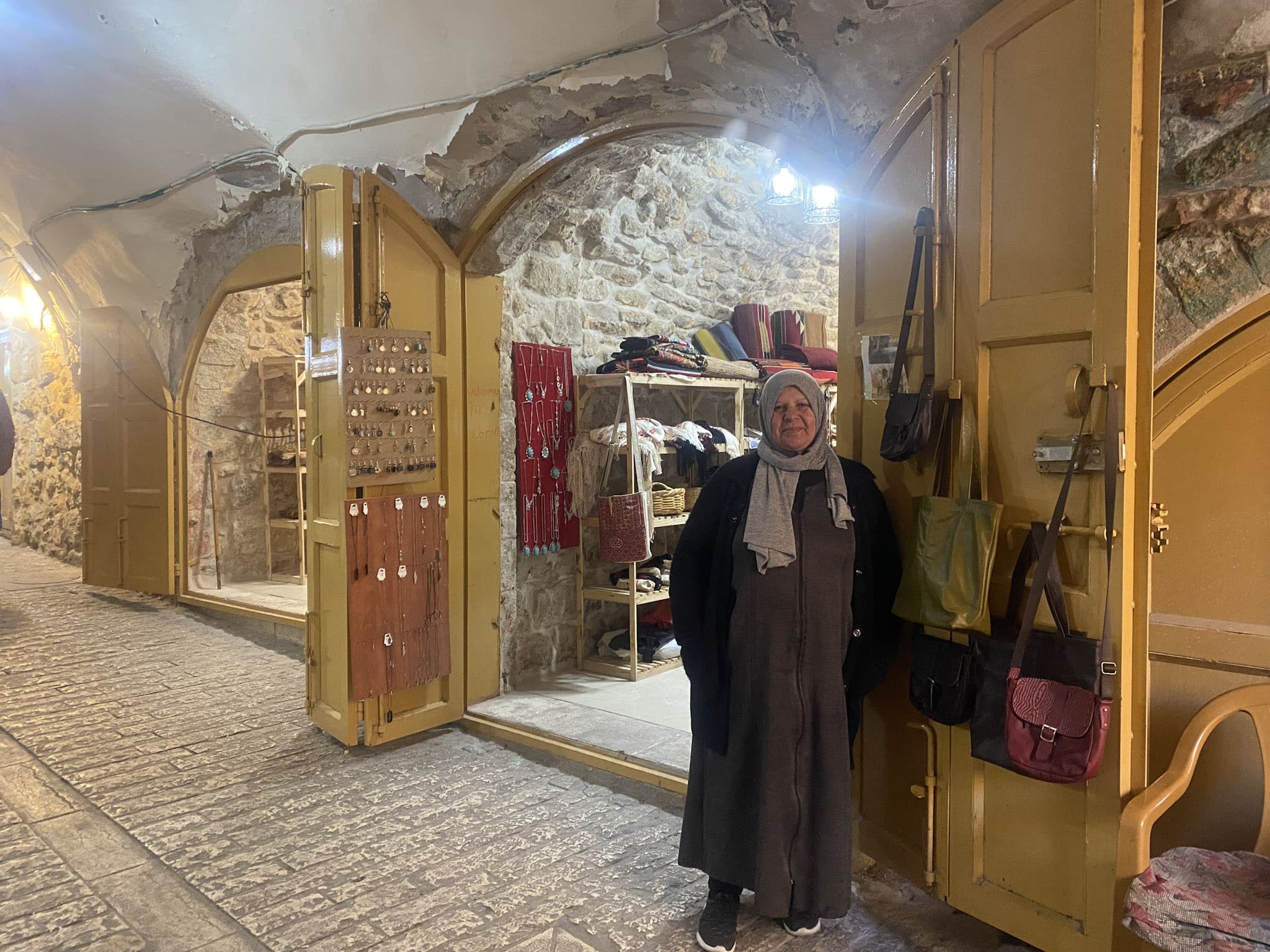
Leila outside the Women in Hebron shop in the souk
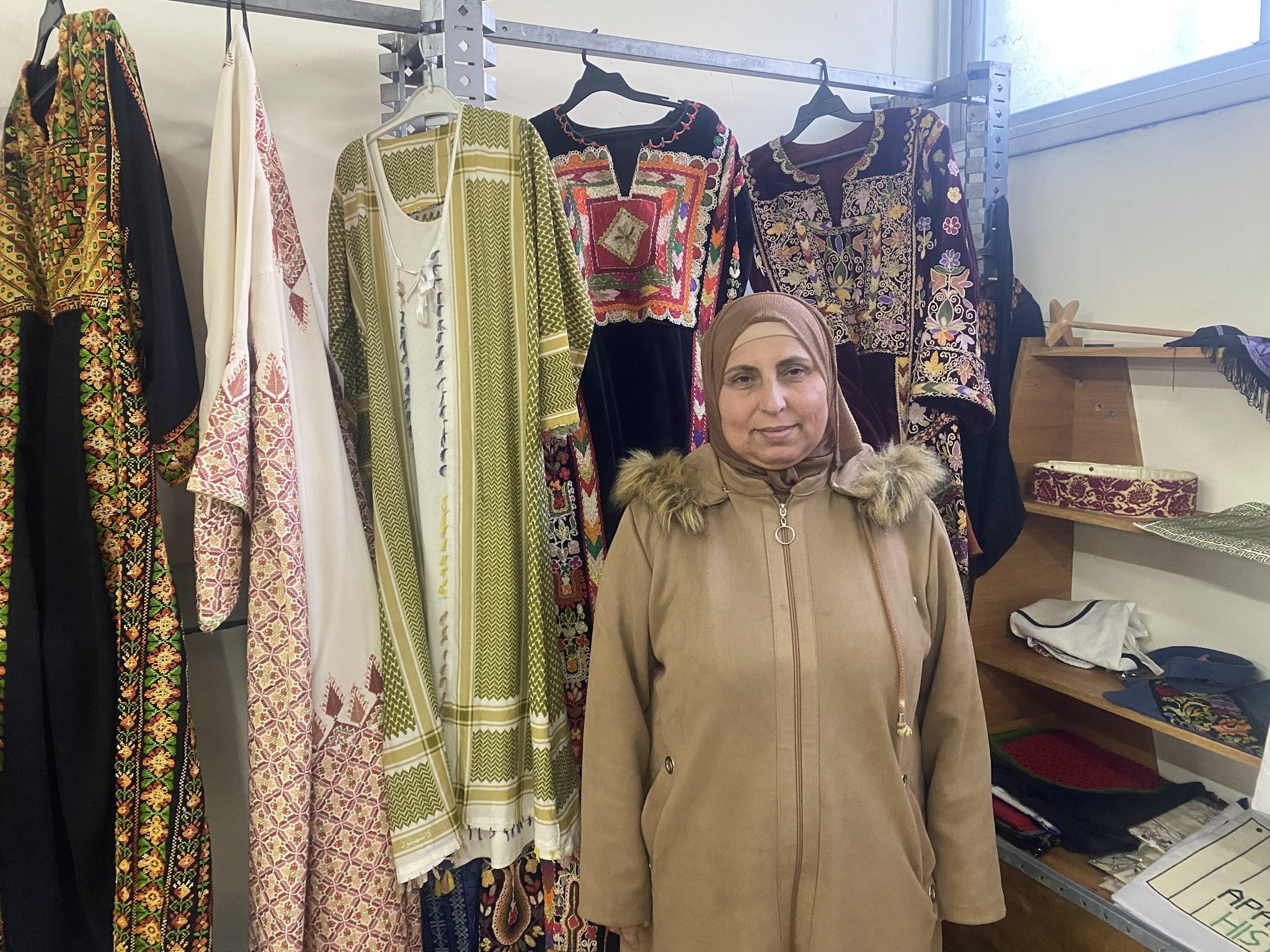
Nawal with dresses made by Women in Hebron
Nawal is a 56-year-old widow. In 2002, Nawal was at home with two young children, they were struggling financially and she needed a way to support her growing family that fitted around raising her children.
She had studied English and worked as a tour guide across the West Bank but despite her qualifications she couldn’t find a job which fitted in with her family life. That’s when the idea for a womens embroidery co-operative was born. It took three years for Nawal to find funders for her project, but in 2005 she founded Women in Hebron, alongside 30 other women from the area. The aim: to give women an income from producing high quality traditional Palestinian embroidery which fitted around the demands of family life.
‘When women are strong financially they can raise their voice.’
Nawal, Women in Hebron
Her sister, Leila, used to work in Jerusalem until Israel built the separation barrier which cut her off from the city. Now, Leila is the first female shopkeeper to open a shop in the souk in the Old City of Hebron. She sells the handmade products made by Women in Hebron.
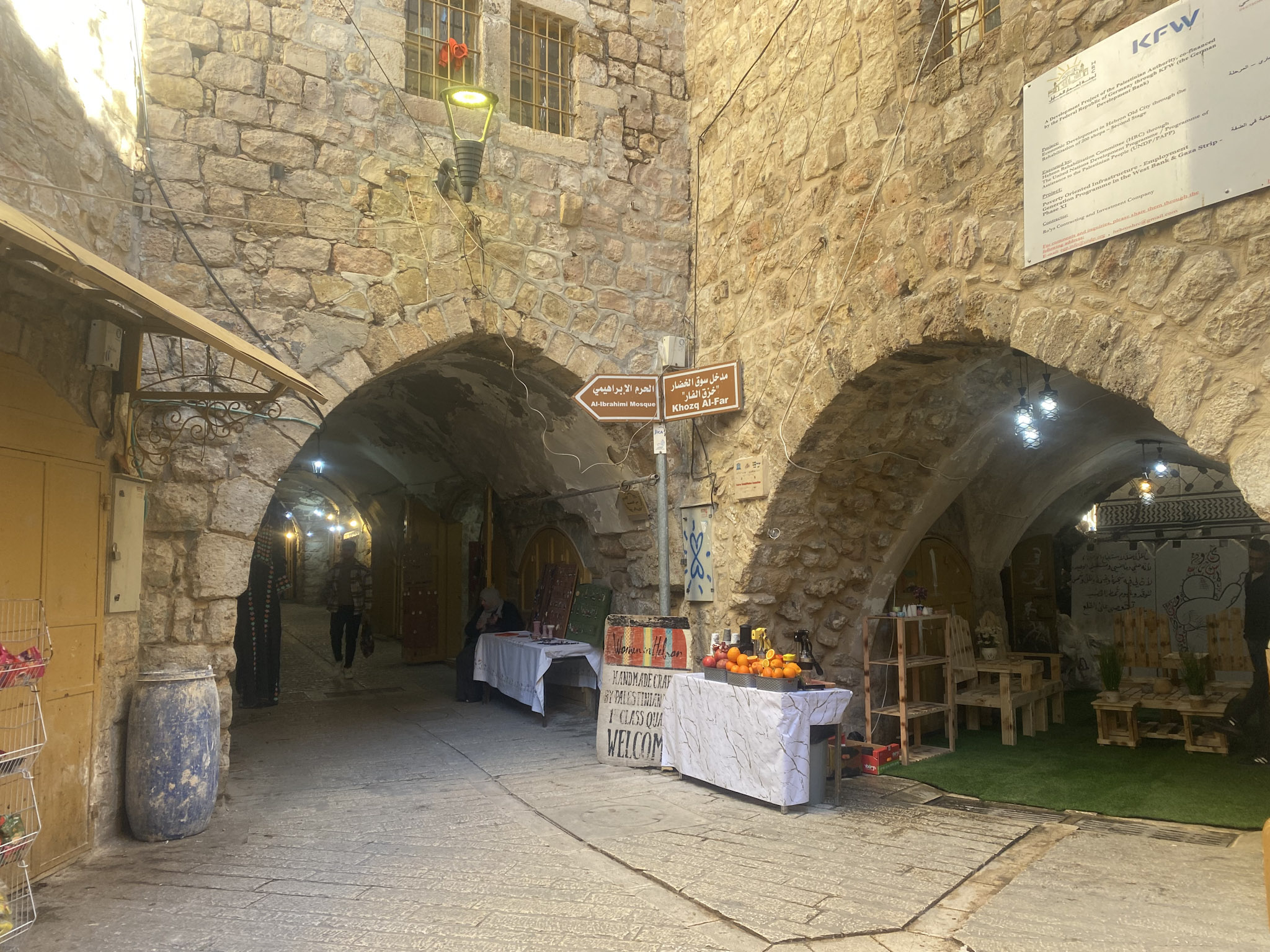
Outside Leila shop in the souk

Leila with the shop sign outside the souk
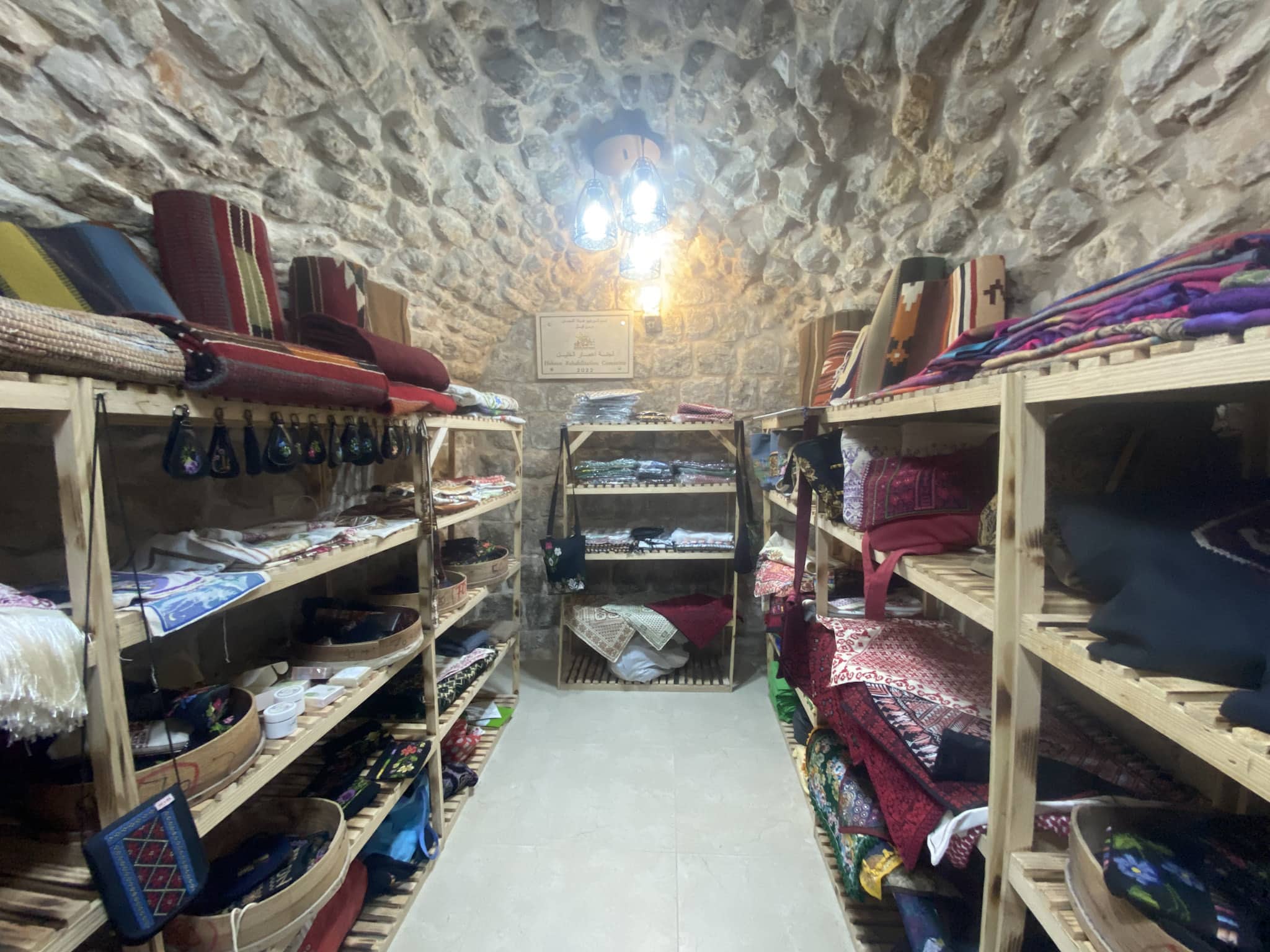
Inside Leila’s shop in the souk
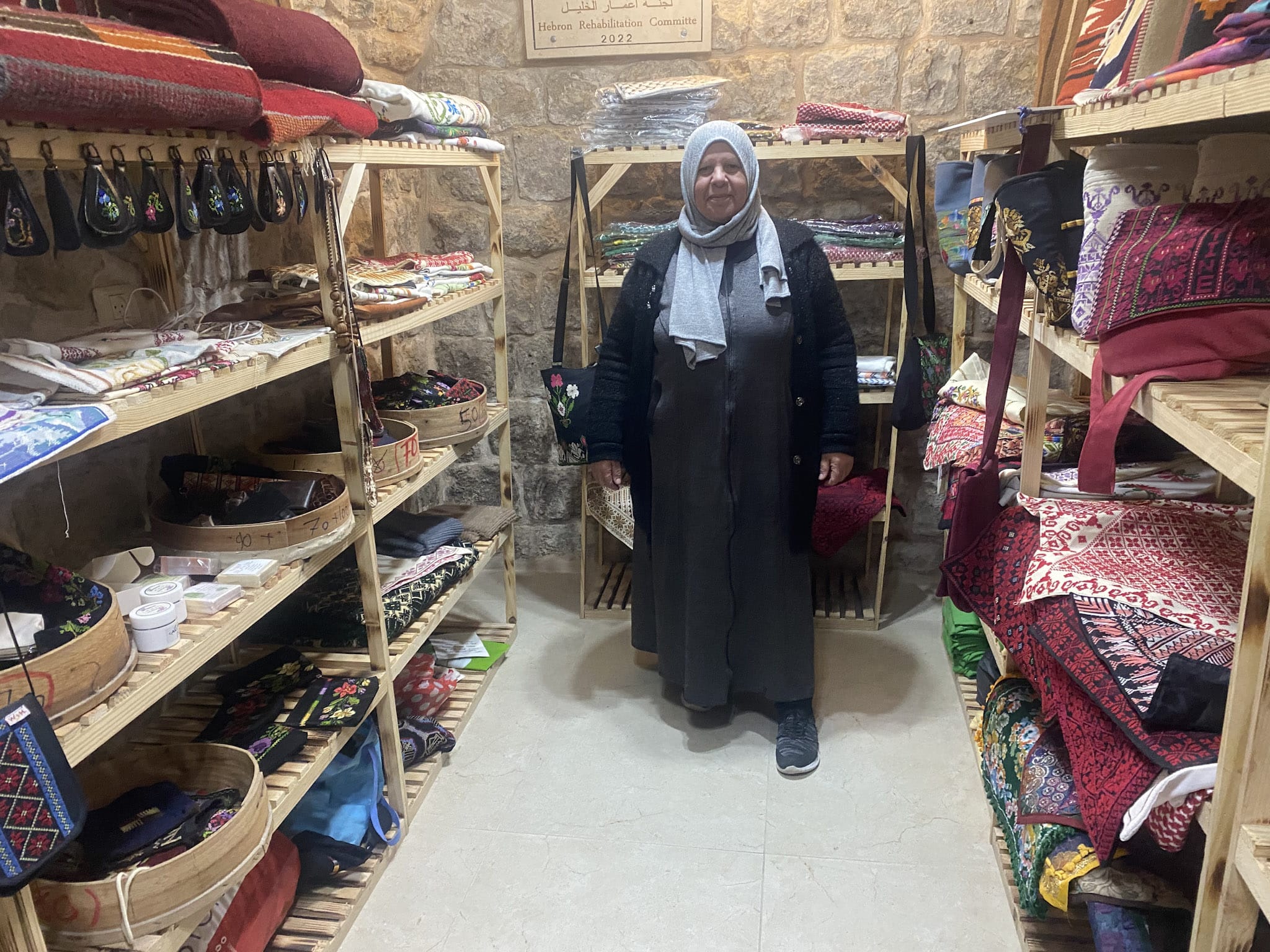
Leila with her stock
Both Nawal and Leila are passionate about supporting Palestinian women. They tell us that they are trying to address the effects of life under occupation for as well as giving women a platform to advocate for themselves.
One of these issues is unemployment. The Palestinian economy is struggling as a result of the prolonged military occupation, compounded by the effects of the COVID-19 pandemic and increasing prices due to the global economic situation. Unemployment rates amongst Palestinians is extremely high with many struggling to support their families. For women, the situation is even worse:
‘As of 2021, only 23% of Palestinian women aged 25 – 49 were employed.’
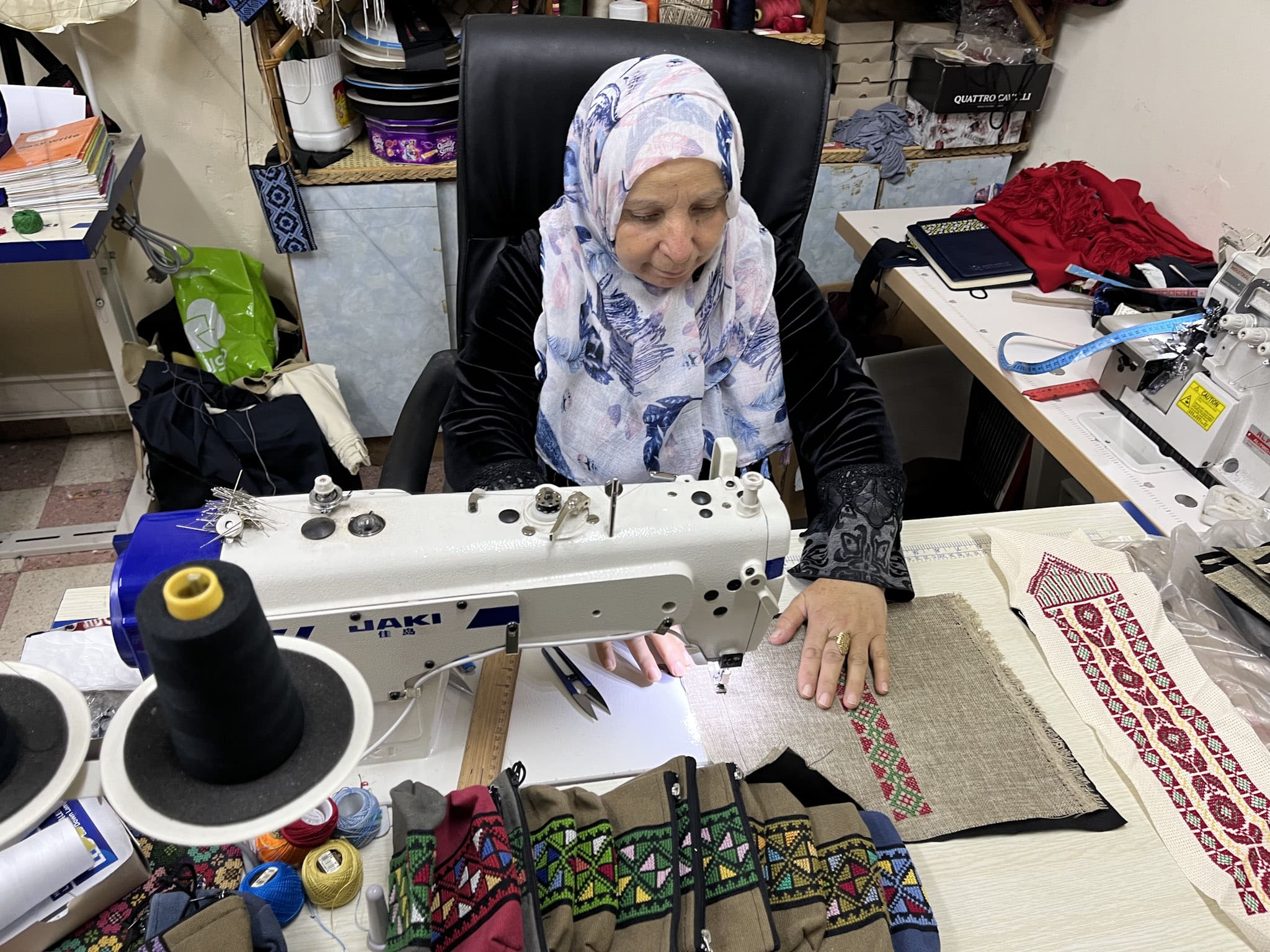
Member of Women in Hebron sews a cushion cover
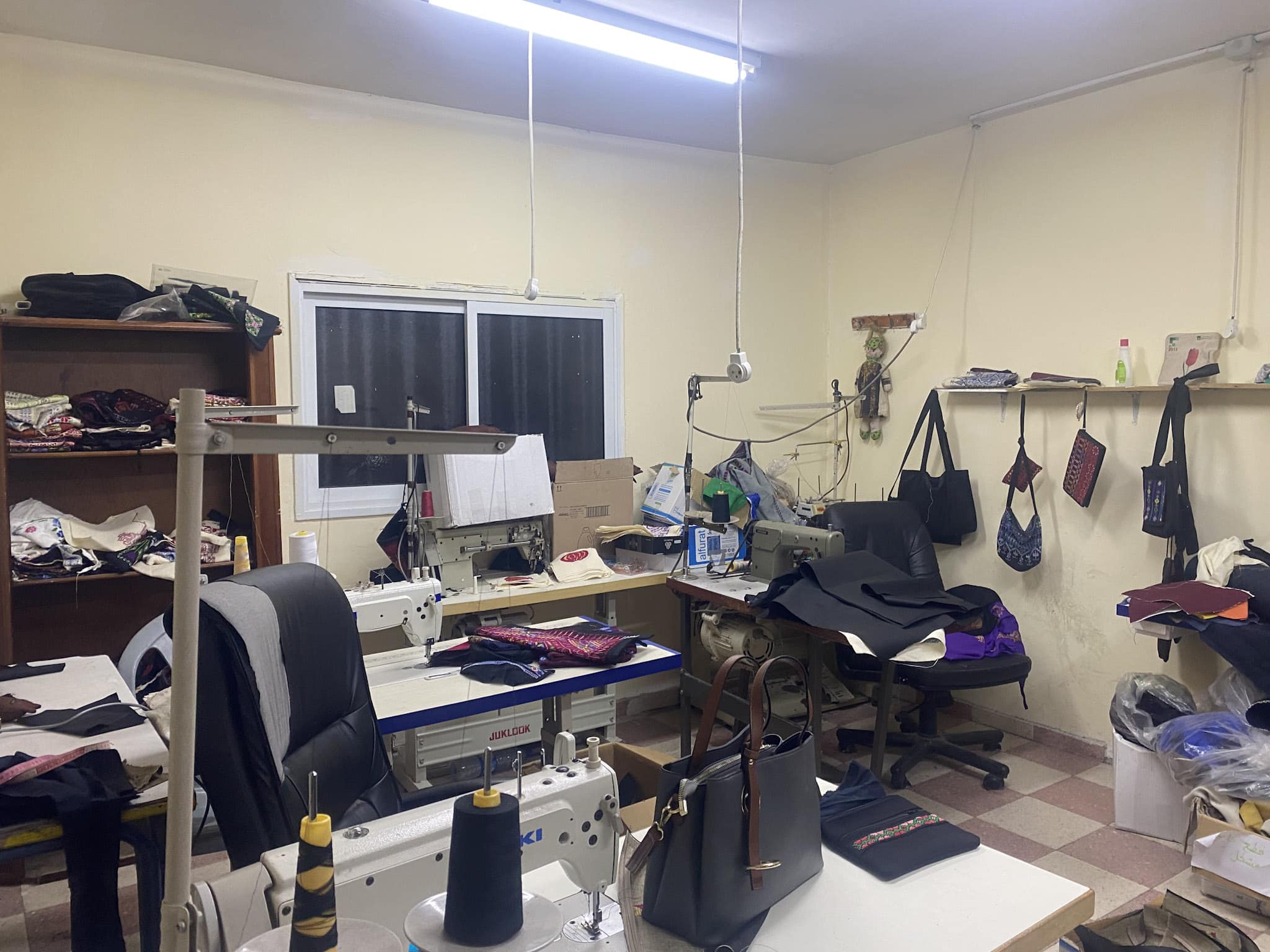
Women in Hebron workshop
‘Women in Palestine are subject to various social hurdles that impede their ability to advance in the formal employment sector, and must endure the negative implications of restrictions imposed by Israel’s occupation of the West Bank and Gaza.’
For many Palestinian men, the only viable option for employment is to cross through the military checkpoints which stretch across the length of the West Bank, to pick up day-rate construction jobs in Israel. For many this takes a huge toll on their whole family – the work is usually unreliable and gaining a permit from the Israeli authorities to cross the checkpoint isn’t easy or guaranteed. Some men leave home by 3AM each day to make the journey and return late in the evening missing out on spending time with their family and meaning the responsibility for this often falls to women.
‘Our men build their houses and their settlements. This is how the Israeli politics works. We fight their settlements and then we have to build them. This is very hard for me to accept.’
Nawal, Women in Hebron
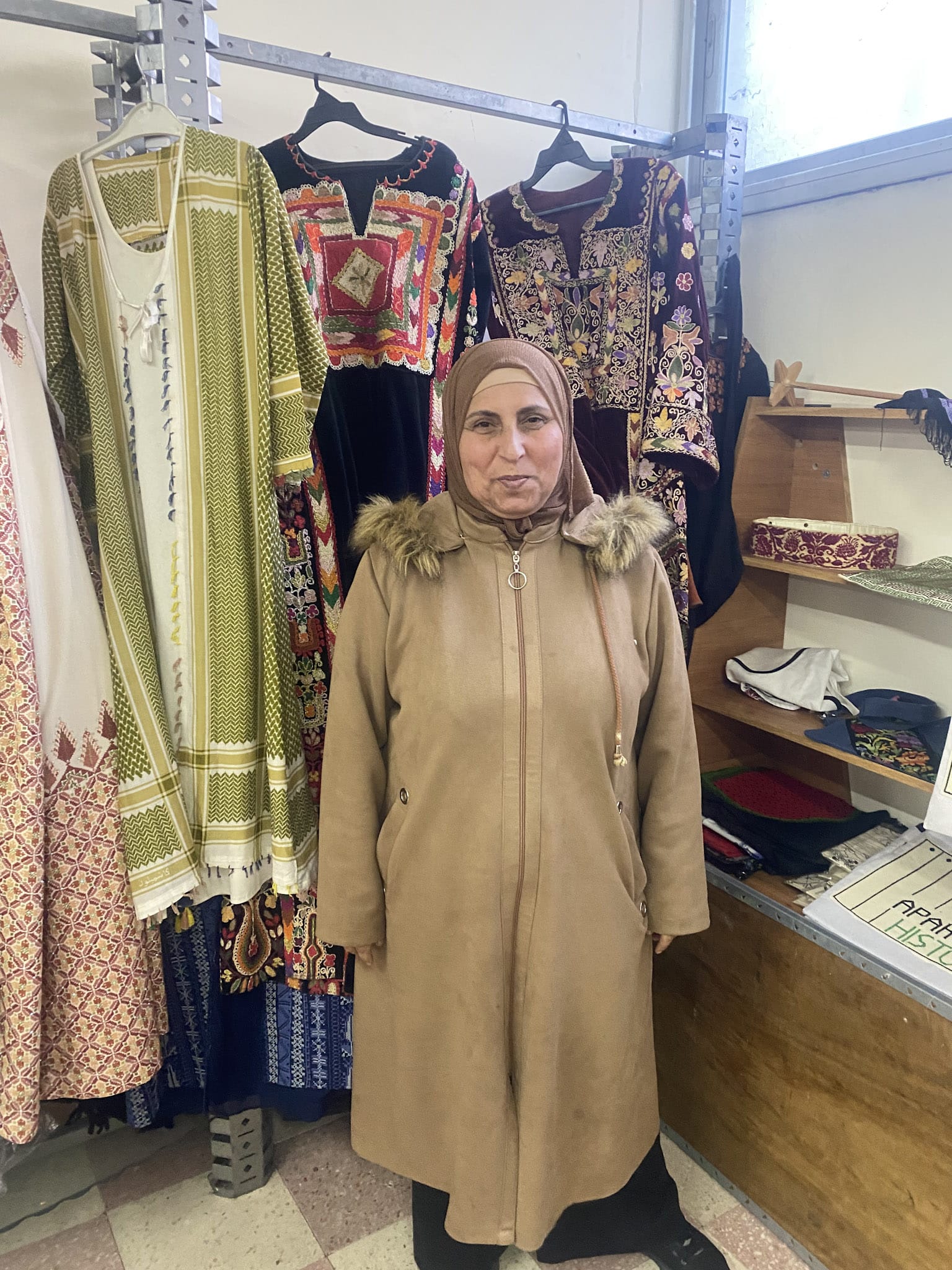
This is the case for many men living in Nawal’s town of Idhna, situated between Hebron and Tarquimia, where one of the many checkpoint crossings is located. Home to 30,000 people, Idhna is a busy town with a growing population. However in the picturesque hills and land surrounding Idhna, Israeli settlements are expanding. This means the Palestinian population are unable to build new houses or develop the town. This has further worsened the living conditions for Idhna’s residents.
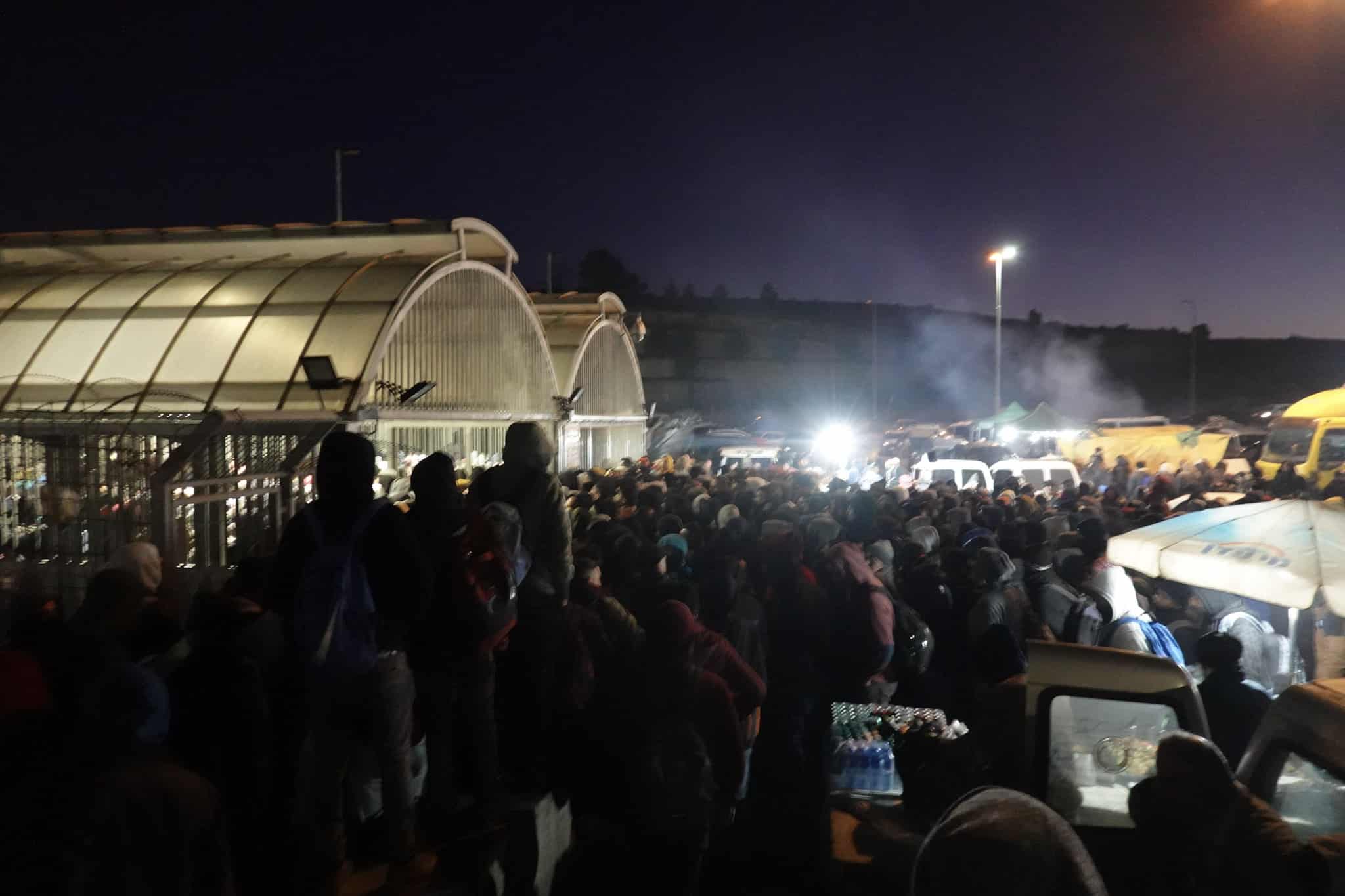
Palestinians workers queue at Tarqumiya checkpoint
Idhna is situated in Area C, an area which makes up over 60% of the West Bank and is under full Israeli military control. Palestinians in Area C are subject some of the most severe restrictions on home and economic life.
‘Israel’s policy in Area C is based on the assumption that the area is primarily meant to serve Israeli needs, and on the ambition to annex large parts of it to the sovereign territory of Israel. To that end, Israel works to strengthen its hold on Area C, to further exploit the area’s resources and achieve a permanent situation in which Israeli settlements thrive and Palestinian presence is negligible.’
As well as the difficulties in obtaining permits from the Israeli authorities for building homes, Palestinians are also restricted from conducting business in Area C. The World Bank estimates that;
‘Granting Palestinian businesses access to Area C could boost the Palestinian economy by a third and increase revenues by 6% of GDP.’
Nawal and Leila are still feeling the effects of COVID-19 on their business and the lack of international visitors to their shop but they remain hopeful for the future and impact of the Women in Hebron co-operative. They are striving to provide the most vulnerable women, often those who have been widowed, or whose husbands cannot find work in the West Bank, with flexible work and in turn keeping traditional Palestinian handicrafts alive.
In the meantime, many Palestinians, mainly men, face the hard choice of seeking employment in Israel and women face the prospect of raising a family and running a home with with very few flexible employment options.
‘Due to the fact that men aren’t able to work and they have children who need an education which can be expensive. With Women in Hebron work, women can work in their homes and can be flexible with when they do the work.’
Nawal, Women in Hebron
The Women in Hebron workshop is a hive of activity, women come from across the town to use the sewing machines, as well as to drop off their crafts to be sold in Hebron. However it is also a place for women to meet, chat and share food, an important space in a crowded town surrounded by settlements and Israeli soldiers.
Nawal and Leila know that the occupation continues to bring challenges to men and women living across occupied Palestine. They also remain hopeful that changes will come.
‘Not everything in life is sweet. You get sweet and you get salt. But with hope I will continue my life.’
Leila, Women in Hebron
Take action!
-
Follow and support the Women in Hebron by visiting their online shop, sharing their videos and posts on social media, or taking a trip to Hebron to learn about the city and visit Leila’s stall on the souk.
-
Send this eyewitness story to your Trade Union or bodies you are part of associated with workers’ rights. Share your concerns and to call on them to put Palestinian workers rights on the agenda.
-
Learn more about the experiences of Palestinians working in Israel by reading our recent eyewitness story, Palestinians working in Israel: ‘the constant anxiety‘ and learn more about the impact of the occupation on the Palestinian economy here.

